Month 12:15, Week 2:7 (Shibi'i/Sukkot), Year:Day 5949:339 AM
2Exodus 5/40
Gregorian Calendar: Tuesday 19 Febuary 2019
The High Places of Isaac
Dark Altars are Back With Us Again
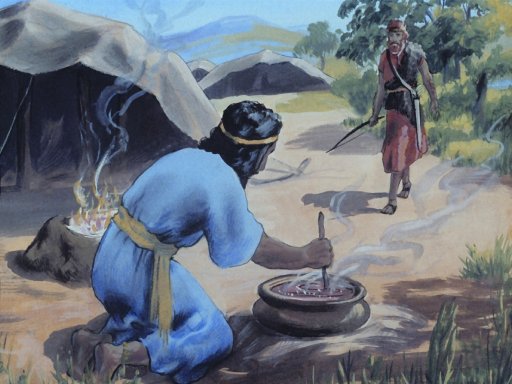
Introduction
Shabbat shalom, welcome to this second assembly of the last month of the sacred year and, I pray, to the ever rapidly approaching days of spring. And because the biblical New Year is not far off, I am led strongly today to get prepared for it, for this coming sacred year will be like no other. We, in my generation at any rate, are being given an opportunity which we may never be offered again before we must pass the baton on further.
The Days of Amos
Today we are going to be taking a look at a couple of passages in the Book of Amos so if you'd like to find that book in your Bibles and have it open and ready, we can get underway this morning. The reason we are going to be looking at this navi (prophet) is because his times were almost identical in character to our own. If you decide to make a private study of this short book afterwards, which I recommend, then take a look at the Book of Hosea too, as these two nevi'im (prophets) were contemporaries addressing an identical situation.
A Short History of the Two Kingdoms
These were the days of the Two Kingdoms. After Solomon's death, the unity of the Twelve Tribes of Israel broke down, as had been prophesied, and the nation was split into two parts: a northern Kingdom led by Jeroboam also called 'Israel' with capital in Samaria, and a southern Kingdom led by one of Solomon's sons, Rehoboam, called 'Judah'. Civil war had ensued between the two halves when the north rebelled, unwilling to live under the harsh and oppressive terms demanded by Rehoboam. This was a time of great instability with the average reign of a northern king being no more than three years because so many of them were assassinated. The south fared better, the average reign of a king being 33 years which interestingly was the age at which Yah'shua (Jesus), who was in royal succession to Solomon, died on the cross.
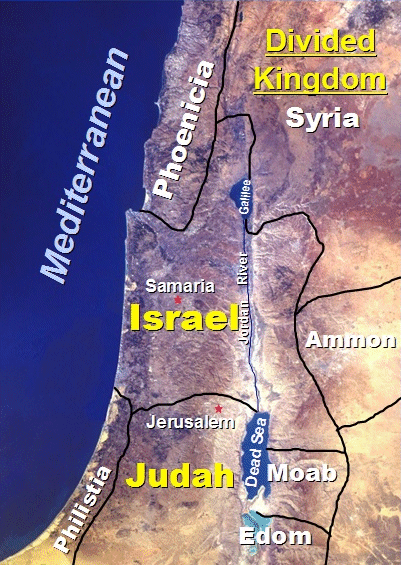
Great Material Prosperity
Amos is a prophecy about the northern Kingdom. In his day an era of peace and prosperity was being enjoyed. Assyria was the big superpower of the day but Jonah's visit and conversion of Nineveh to Yahweh had effectively postponed any threat that nation would pose to Israel for at least a generation. So Israel was enjoying a time of great material prosperity, especially under Jeroboam II. He had stabilised the nation and was enjoying the benefits of being at the junction of the trade routes between Europe and Arabia.
Financial Disparity, Corruption and Immorality
Having said that, though, there was huge economic disparity between the rich and the poor. Many enjoyed the consumer society with its goods and even possessed second homes - summer residences - up in the cooler hills. There was a new aristocracy, or nouveau riche, consisting of those who had 'got rich quick'. The only trouble was, as the rich got richer, the poor got poorer. Sound familiar? Morally this was a disaster. There were financial scandals, bribery and corruption and there was no justice in the courts where success meant bribing the judges. Because they could make more money that way, they abandoned the sabbath and traded seven days a week, just as happens now. Greed led to injustice and affluence led to permissiveness and sexual immorality - just like today.
Religious Apostacy
The nation was very religious indeed but it was not the religion of the Tanakh (Old Testament)! Rather, the people had become enamoured of the religions of the surrounding nations, and in particular the Ba'al worship of old Canaan. With merchants pouring into the country from West and East came religious ideas from the West and East too. The cult of the worship of 'mother nature' was by far the most popular. Worshippers had sex with temple prostitutes at the temples at Bethel and Samaria in order to supposedly bless their crops. There was even a golden calf set up at Bethel, reproducing the sin committed by Israel at Sinai. In a word, the Israelites had abandoned the Torah and become like everyone else. Go into any Western country today and you'll see that what is believed and practiced is much like everywhere else.
Yahweh's Remedies
What's important to realise is the remedies implemented by Yahweh to bring this apostate and wicked nation to repentance. And so what followed, announced in advance by the nevi'im (prophets), were:
- 1. Food shortages;
- 2. Water shortages;
- 3. Diseased and ravaged crops;
- 4. Plagues and raids by neighbouring countries;
- 5. Massive lightening strikes in cities causing widespread destruction;
- 6. Earthquakes; and finally
- 7. Exile in Assyria.
Prophets of the 'Last Chance'
Amos and Hosea were Yahweh's 'last chance' nevi'im (prophets) sent to a nation that ultimately was unwilling to repent. It is, sadly, the same today. Though individuals repented back then, and though individuals today are repenting now, the nation as a whole did not. And I have to tell you most soberly, so that you are under no illusion, that a similar result is expected in the former Christian nations of the 21st century. I pray that I am wrong and that some nations will repent but it looks unlikely. There have been numerous postponements of Judgment but as I think ought to be clear now, overall the West is becoming less and less receptive to emet (truth) and becoming more and more wicked. Just look at what has happened in the last decade!
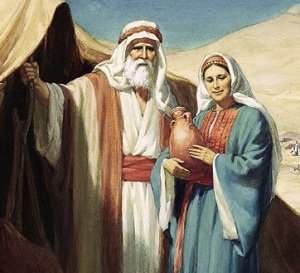 Isaac (Yitshak) and Rebekah (Rivkah)
Isaac (Yitshak) and Rebekah (Rivkah)
The High Places of Isaac
The substance of today's message revolves around a mysterious passage in the Book of Amos so if you would turn with me to the 7th chapter and 9th verse we will get underway this morning:
"The high places of Isaac will be destroyed
and the sanctuaries of Israel will be ruined;
with my sword I will rise against the house of Jeroboam"
(Amos 7:9, NIV).
The Man Isaac
This is a very unusual scripture. Though idolatrous "high places" are named in 62 places in the Tanakh (Old Testament) for both the Kingdoms of apostate and rebellious Israel and Judah, never, except here, are they referred to as "the high places of Isaac". Now the patriarch Isaac, to be sure, had his weaknesses, but never was he an idolater. This gentle, pious man, the son of Abraham and father of Jacob who was renamed Israel for overcoming his carnal nature, has a comparitively low profile when you compare his life with his illustrous father and son. But just as Abraham produced a troublesome son Ishmael, so Isaac produced a troublesome son Esau, and Esau, as you know, was a crass idolater. Moreover, Isaac and Ishmail came from different mothers (Sarah and Hagar) whereas Jacob and Esau came from the same one (Rebekah). And what a contrast in character these two men were!
Esau
You will remember that Esau was not a spiritually-minded man in the least. Indeed, he viewed spiritual matters with disdain and contempt, and became a skilled and adventurous hunter like his wicked ancestor Nimrod. Unlike his blameless brother, Jacob, who is described as "a quiet man, staying among the tents" (Gen 25:27, NIV), Esau was fleshy-minded and materialistic who "had a taste for wild game" (Gen 25:28, NIV).
A Split Family
Had the parents of Jacob and Esau been of one mind, the tragedy that unfolded might have been averted, but as scripture tells us, "Isaac...loved Esau, but Rebekah loved Jacob" (Gen.25:28, NIV). Why? Because Isaac had a weakness for good food, and Esau the hunter provided it while the more spiritual son concerned himself with heavenly matters and apparently did the cooking, at least some of the time. You all know the story of how a hungry Esau sold his birthright to his brother Jacob for a bowl of red pottage or stew (Gen.25:29-30). Even Rebekah, who was apparently more discerning than her husband Isaac, conspired, using deception, to ensure that Jacob also obtained the firstborn's patriarchal blessing, even though he had legally acquired the birthright.
The Fear of Isaac
The point of this potted history is to remind everyone that there is a dark side in everyone. Jacob had to flee for his life because of his action in deceiving his father into thinking he was the elder brother for the blessing. Isaac may have been a gentle and pious figure, beloved of Yahweh, whose name became proverbial along with those of his father and younger son when the Creator was pleased to be known to Moses as "the Elohim (God) of Abraham, the Elohim (God) of Isaac, and the Elohim (God) of Jacob" (e.g. Ex.3:20, NIV) and even as "the Elohim (God) of Abraham and the Fear (Pachad) of Isaac" (e.g. Gen.31:42), a title given to no other man that we know of - but he also had his faults. To have the fear of Yahweh we understand to mean that Jacob had a fear of judgment for sin as well as an overflowing love for the Creator. Furthermore, it has been suggested by scholars that the word pachad might also mean "kinsman", putting Isaac in very high spiritual standing indeed, on par with David being known as the "friend of Elohim (God)", explaining why he was so honoured.
The Character of Esau
All of this makes "the high places of Isaac" of Amos 7:9 all the more intriguing and baffling until you realise that both Abraham and Jacob had their weaknesses too. And Isaac's was evidently his passion for good food which biased his mind away from godly Jacob and toward Esau the supplier of tasty vennison. While Jacob was away in Harran, Esau manifested more of his true character. He left the Promised Land of Canaan and moved the family to Seir in Horite territory south of the Dead Sea, marrying two pagan Hittite women, Judith and Basemath, who proved to be a source of bitterness to both Isaac and Rebekah (Gen.15:13; 25:29-34; Heb.12:16).
The Judgment of Yahweh
Yahweh does not pull His punches when it comes to the judgment of Esau and his house:
"'Was not Esau Jacob's brother?' Yahweh says. 'Yet I have loved Jacob, but Esau I have hated, and I have turned his mountains into a wasteland and left his inheritance to the desert jackals'" (Mal.1:2-3, NIV; also Rom.9:13).
Isaac the Man of Faith
We must ever be on the alert against both favouritism in family relationships and any tendency to satisfy strong fleshy desires that would overwhelm the spiritual. And whatever Isaac's weaknesses may have been in his old age when he was all but blind, He was still Yahweh's kinsman, because he was in the mainstream Ruach (Spirit) of his father Abraham because of his emunah (faith):
"By emunah (faith) Abraham, when called to go to a place he would later receive as his inheritance, obeyed and went, even though he did not know where he was going. By emunah (faith) he made his home in the promised land like a stranger in a foreign country; he lived in tents, as did Isaac and Jacob, who were heirs with him of the same promise. For he was looking forward to the city with foundations, whose architect and builder is Elohim (God)" (Heb.11:8-10, NIV).
The City of Elohim
Whatever "the high places of Isaac" were, Isaac was not the architect of them because his eyes were on "the city with foundations, whose architect and builder is Elohim (God)". Nonetheless, there is a bit of Esau in all of us but we must pay no heed to its enticing call. It's call is the fleshy nature, the carnal nature, the fallen Adamic nature, and it is a nature implaccably idolatrous and hostile to the ways of Elohim (God) and all that is spiritual. That same nature, incidentally, was in Jacob too, who initially was a deceiver but who in the end overcame at Peniel and was renamed Israel, just as his father Abram had been renamed Abraham for likewise overcoming. We too shall get a "new name" (Rev.2:17; 3:12) and shall dwell in "the city of ... Elohim (God), the new Jerusalem, which is coming down out of heaven from ... Elohim (God)" (Rev.3:12, NIV) if we are faithful like Abraham and Isaac. But those "high places of Isaac" will be destroyed, and we with them, if we do not lay them aside of our own free will. And we will be buffetted by the Adversary all our lives so long as we hold on to them while Yahweh's grace - His undeserved loving kindness - continues to work on our hearts to reform us. So let us not be materialistic or lack appreciation for sacred or spiritual things like Esau.
The Earth is Here to Stay
Having said that, I do not want anyone to 'go gnostic' and conclude that everything material is 'bad'. We are absolutely not to get the idea, as the gnostics did and as so much gnostic-inspired religion today teaches, that we are to utterly forsake the material and look exclusively to the invisible and spiritual. Not at all. It's all a matter of priority. The whole point of the resurrection is not to escape from the world of matter but to transform it with the invisible spiritual power of Heaven. We are to be changed in our minds and hearts while we live in these tabernacles of clay, our physical bodies. Earth is here to stay and Yahweh intends it to be permanently inhabited by His sons and daughters in the future in a renewed state cleansed of sin and freed from the Fall. And even though nearly everyone must die first, we're coming back one day!
Isaac and Beersheba
I am sure you have by now figured out by now that 'Isaac' in the "high places of Isaac" does not refer to Isaac the man but to his descendants, literal and spiritual, in much the same way as the high places of Israel and Judah do not refer to these patriarchs but to their descendants, literal and spiritual. So why is "Isaac" mentioned at all? Because Yahweh is pinpointing a place or actual location, and specifically Beersheba which was especially associated with Isaac (Gen.27:28; 28:10). Indeed a couple of chapters earlier in Amos we read:
"This is what Yahweh says to the house of Israel:
Seek me and live;
do not seek Bethel,
do not go to Gilgal,
do not journey to Beersheba.
For Gilgal will surely go into exile,
and Bethel will be reduced to nothing.'
Seek Yahweh and live,
or He will sweep through the house of Joseph like a fire;
it will devour,
and Bethel will have no one to quench it"
(Amos 5:4-6, NIV).
Beersheba, Gilgal and Bethel
There's a lot hidden in here that is easy to miss. Does anyone know where Beersheba was, and still is, located? Right on the southern border of the tribal territory of Judah. Indeed, it was the extreme most southern city of the Tribal Inheritance, even though the territory actually extended a little farther south. People in the northern Kingdom of Israel would have to "pass" or cross-over the tribal territory of Judah to reach the famous sanctuary city associated with Isaac. In the reference to Gilgal (and remember, this is where the children of Israel were circumcised when they crossed the River Jordan under Joshua) in this passage there is one of those plays on sound, impossible to translate into English, which are so common in impassioned speech: Chag-Gilgal galóh yigleh. And in the verse about "Bethel" (which means 'House of El (God)') Aven ('Nothing'). Hosea actually calls it "Beth Aven", or the 'House of Nothing' (Amos 4:15; 5:8; 10:5) and also 'Nothing' (Aven - Amos 10:8).
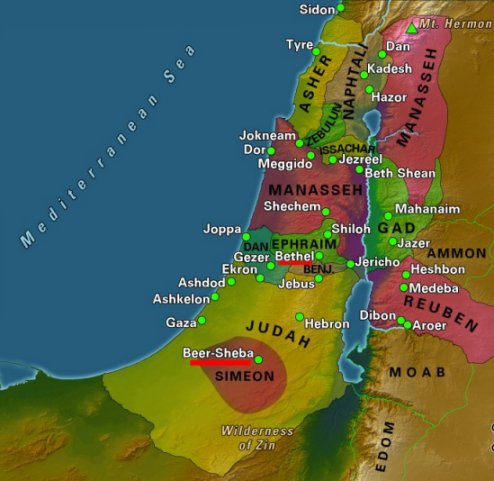
The Righteous of the Past Cannot Save You
When judgment comes, the important and great places because of their historical association with righteous men like Joshua, Isaac and Jacob become 'nothing'. The past cannot save you. And though judgment of people is frequently postponed because of a righteous ancestor or historial figure like King David, for instance, that period of grace is not indefinite. We cannot cling to the coat tails of our righteous ancestors and hope to be spared, not beyond a certain point, at any rate.
The Period of Grace is Over
Amos' message is not a happy one. Grace has become exhausted, the Mishpat Yahweh or Judgment of Yahweh cannot be delayed any longer, therefore nevi'im (prophets) are commanded to announce what Yahweh is about to do. The judgment here, though it incorporates Isaac because of his city, concerns the House of Joseph, the House of Ephraim, and the House of Israel, which are one and the same. They - the inhabitants of these territories - were not expecting this judgment because they had got away with their sinning for so long. But now, the one-time House of El (God) (Bethel) was demoted to the 'House of Aven' - the 'House of Nothing'. The covenant is broken - it is over. And in case you had forgotten, the word 'Beersheba' literally means 'the well of the oath' or the 'well of seven', seven being the number of covenant, a covenant that is reiterated and expressed clearly in the sacred Creation Calendar with its seven-day week and its seven annual festivals, to name but two instances of the use of this number .
Beresheba's History
It was into the wilderness of Beersheba that Hagar wandered with Ishmael after her dismissal by Abraham (Gen.21:14). It was here that Abraham's well was seized by by the Philistines and it was here that King Abimelech avowed his ignorance and concluded a covenant with Abraham and accepted seven female lambs from him in token of Abraham's title to the well. Abraham called the place 'Beersheba' because of the oath both men had taken, calling upon the Name of Yahweh (Gen.21:33). It was from here that Abraham went to Moriah to offer Isaac as a sacrifice and where he returned to dwell (Gen.22:19). So Beersheba was full of history. Isaac also lived here. You can read the whole account in Genesis 26 for there is a lot about this place which is of prophetic significance that we don't have time to go into today.
Three Thousand Years Later
Fast forward 3,000 years to the 21st century. Where is Israel today? In America (West Manasseh), the United Kingdom, Australia and New Zealand (Ephraim), Germany (East Manasseh), the Netherlands and South Africa (Zebulun), France (Reuben), and so on, and what do you see? You see nations teetering on the verge of collapse. And when they collapse, the whole world will collapse with them, because these once great Christian nations are now heathen and apostate like Israel of old. They were once Bethel, the House of El (God), but now they are rapidly becoming Beth Aven, the House of Nothing. We are about to see history repeat itself. There is a narrow window for repentance but it will not last much longer. The West - and all the world - must repent or perish (Lk.13:5). For this woe - this tribulation - will not pass by.
Altars of Ba'al Everywhere
The High Places of Isaac - and of Israel and Judah - are back with us again, everywhere. Everywhere there are altars to Ba'al. The dark rulers that we have - the Deep State, the Illuminati, call them what you will - are only in power because the people have given them permission to be by their sinning. Where are the righteous rulers of the West now? Can you point to any? Certainly in the USA, Poland, Hungary and Russia we are seeing bursts of light, but how long will they last? Their leaders cannot hold back the tide for ever unless the people repent. The citizens cannot ride on their coat tails for very much longer.
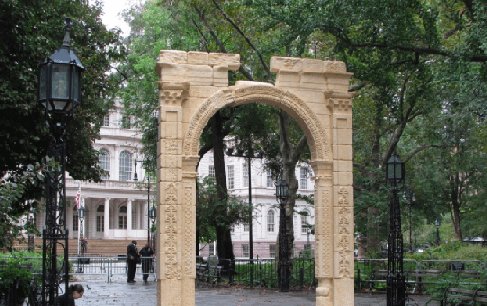 Arches to Baal are appearing in capitals all around the world
Arches to Baal are appearing in capitals all around the world
in honour of paganism - this one is in Washington DC, USA
Deliverance for the Repentant
There is deliverance for those who will bend the knee and submit to the Creator. There is tiqveh (hope) for those who will choose it. They must put their trust in the Resurrected One. I don't want to go into the resurrection today as we shall soon be celebrating that at the spring festival of Yom haBikkurim, the Day of Firstfruits, Yah'shua (Jesus) being the firstfruits of the resurrection, not to be confused with the pagan 'Easter' which came to supplant the original commemoration, other than to testify that it is the resurrection that we must trust in. Yah'shua the Messiah (Jesus Christ) was, and is, Elohim's (God's) Messenger, carrying all the saving promises made originally to Abraham, Isaac, Jacob, Moses, David and the nevi'im (prophets), and not only for Israel but for the whole world. The command is, "Seek Yahweh and live."
Beware of Pious Fraud
I said that this year would be one of great change, and so it shall be, but do not put your trust in the arm-of-flesh, and certainly not in governments. Our only hope is Yah'shua (Jesus) now. Throw yourself at His feet and beg for mercy. Present yourself for service. But we are only as useful to Yahweh as we are available to Him, and our availablilty is purely a matter of personal choice. We can withhold from Him as much or as little as we desire. Then we become as useful to His Kingdom as the amount of ourselves that we are willing to present to Him. Remember the Oswald Chambers quote I shared with you recently? Until I "break the husk of my independence from God" all the rest is "pious fraud". And just so you know, the will of Yahweh is always different to what you expect. It's always bigger and ultimately far more glorious than you could ever imagine. This means you will discover that so much of what you thought was important, wasn't. You'll know that's true as all the various projects you undertook that were not in His plan come to nothing.
Conclusion
Corrie Ten Boom, 30 years after her release from a nazi concentration camp and after 30 years of telling her story, told Yahweh that she wanted to move on and do something else for the Kingdom. Yahweh told her to keep on telling her story because that was His will and her mission. I have had a similar chastisement and been told to warn eveyone again because I was tired of bear witness of the same things. So you have my witness again. Don't delay. Don't procrastinate. Do not suppose these warnings are silly scare stories that won't come to pass. These things will come to pass, and soon.
"Awake, awake! Clothe yourself with strength,
O arm of Yahweh;
awake, as in days gone by,
as in generations of old" (Isa.51:9, NIV).
"'Behold, I come like a thief! Blessed is he who stays awake and keeps his clothes with him, so that he may not go naked and be shamefully exposed'" (Rev.16:15, NIV).
May Yahweh bless you and open your eyes wide so that you may know what it is you must do. In Yah'shua's (Jesus') Name. Amen.
Acknowledgements
[1] David Pawson, Unlocking the Bible (Collins, London: 2001), pp.471-478


|


